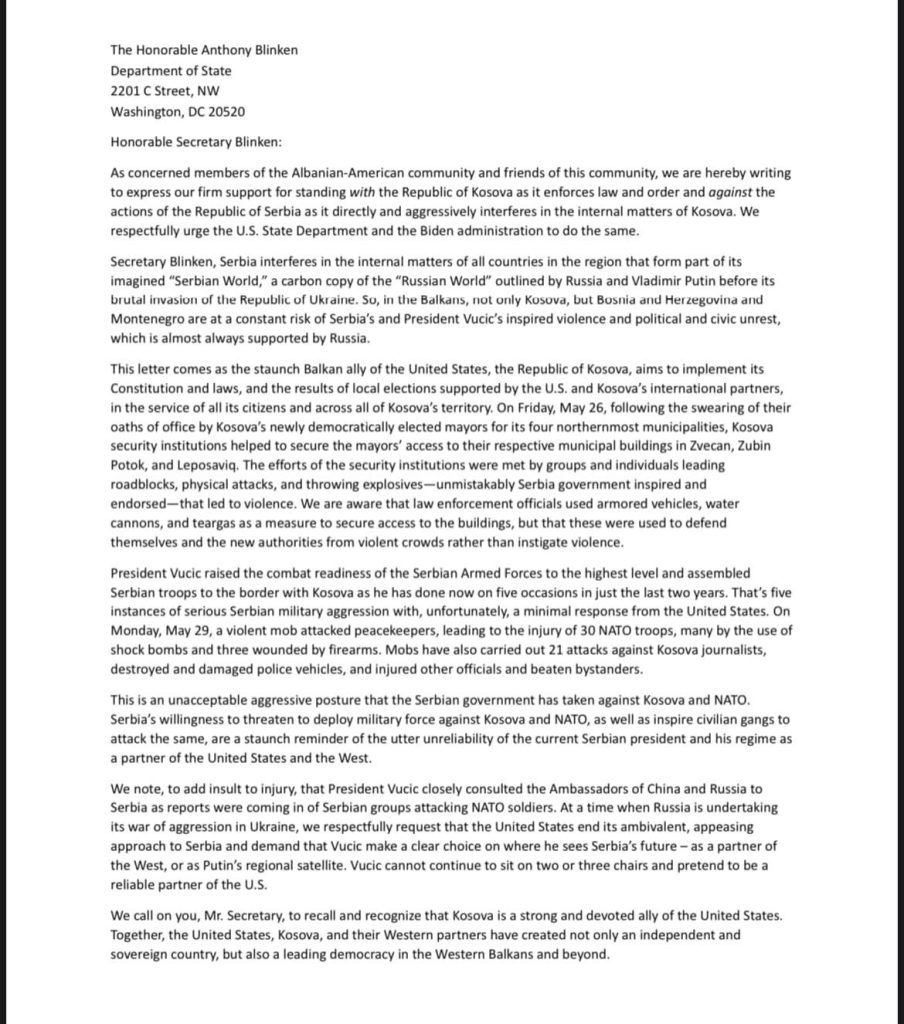The letter, drafted by Besnik Pula and Drilon Gashi, signed by over 40 well-known names of the Albanian-American community, asks the State Department to support Kosovo in its conflict with Serbia.
The letter expresses dissatisfaction with the one-sided position of diplomacy regarding a crisis of Americans from Serbia and invites the State Department to enable a dialogue process that leads to recognition of the facts.
Honorable Secretary Blinken:
As concerned members of the Albanian-American community and friends of this community, we are hereby writing to express our firm support for standing with the Republic of Kosova as it enforces law and order and against the actions of the Republic of Serbia as it directly and aggressively interferes in the internal matters of Kosova. We respectfully urge the U.S. State Department and the Biden administration to do the same.
Secretary Blinken, Serbia interferes in the internal matters of all countries in the region that form part of its imagined “Serbian World,” a carbon copy of the “Russian World” outlined by Russia and Vladimir Putin before its brutal invasion of the Republic of Ukraine. So, in the Balkans, not only Kosova, but Bosnia and Herzegovina and Montenegro are at a constant risk of Serbia’s and President Vucic’s inspired violence and political and civic unrest, which is almost always supported by Russia.
This letter comes as the staunch Balkan ally of the United States, the Republic of Kosova, aims to implement its Constitution and laws, and the results of local elections supported by the U.S. and Kosova’s international partners, in the service of all its citizens and across all of Kosova’s territory. On Friday, May 26, following the swearing of their oaths of office by Kosova’s newly democratically elected mayors for its four northernmost municipalities, Kosova security institutions helped to secure the mayors’ access to their respective municipal buildings in Zvecan, Zubin Potok, and Leposaviq. The efforts of the security institutions were met by groups and individuals leading roadblocks, physical attacks, and throwing explosives — unmistakably Serbia government inspired and endorsed — that led to violence. We are aware that law enforcement officials used armored vehicles, water cannons, and teargas as a measure to secure access to the buildings, but that these were used to defend themselves and the new authorities from violent crowds rather than instigate violence.
President Vucic raised the combat readiness of the Serbian Armed Forces to the highest level and assembled Serbian troops to the border with Kosova as he has done now on five occasions in just the last two years. That’s five instances of serious Serbian military aggression with, unfortunately, a minimal response from the United States. On Monday, May 29, a violent mob attacked peacekeepers, leading to the injury of 30 NATO troops, many by the use of shock bombs and three wounded by firearms. Mobs have also carried out 21 attacks against Kosova journalists, destroyed and damaged police vehicles, and injured other officials and beaten bystanders.
This is an unacceptable aggressive posture that the Serbian government has taken against Kosova and NATO. Serbia’s willingness to threaten to deploy military force against Kosova and NATO, as well as inspire civilian gangs to attack the same, are a staunch reminder of the utter unreliability of the current Serbian president and his regime as a partner of the United States and the West.
We note, to add insult to injury, that President Vucic closely consulted the Ambassadors of China and Russia to Serbia as reports were coming in of Serbian groups attacking NATO soldiers. At a time when Russia is undertaking its war of aggression in Ukraine, we respectfully request that the United States end its ambivalent, appeasing approach to Serbia and demand that Vucic make a clear choice on where he sees Serbia’s future — as a partner of the West, or as Putin’s regional satellite. Vucic cannot continue to sit on two or three chairs and pretend to be a reliable partner of the U.S.
We call on you, Mr. Secretary, to recall and recognize that Kosova is a strong and devoted ally of the United States. Together, the United States, Kosova, and their Western partners have created not only an independent and sovereign country, but also a leading democracy in the Western Balkans and beyond.
Kosova was the first to answer calls to take in Afghan refugees, as well as support the deployment of the Kosova Security Force to serve hand-in-hand with the U.S. military. We urge you to work closely with Kosova’s leadership, President Vjosa Osmani and Prime Minister Albin Kurti, to solve this security situation whilst furthering Kosova’s sovereignty, territorial integrity, democratic development, and inclusion of minority communities in Kosova’s democracy.
We strongly support a peaceful resolution of the crisis, through dialogue and democratic processes, as is being pursued by the Biden administration. We commend the great efforts in earnest of the U.S. Ambassador to Kosova, Jeff Hovenier, for deepening the U.S.-Kosova relationship and managing this security situation.
However, we wish to note our disapproval of the United States’ current approach of applying one-sided pressure on the government of Kosova to engage in concessions with Serbia, including withdrawing elected mayors from municipal buildings, agreeing to the establishment of an Association of Serbian Municipalities, and other unilateral concessions that are neither reciprocated by Serbia nor aligned with the principles of the rule of law, democratic legitimacy, and territorial integrity.
We call for any resolution to this crisis and the political standoff between Kosova and Serbia to be in full alignment with the current Constitution of Kosova, the Comprehensive Proposal for the Kosova Status Settlement of President Ahtisaari, and a dialogue which does not undermine but rather affirms Kosova’s sovereignty. We strongly encourage the U.S. to support a dialogue that leads to mutual recognition of Kosova and Serbia as soon as possible.
Sincerely,
Agim Aliçkaj, New York
Lirim Ashiku, Wisconsin
Harry Bajraktari, New York
Nador Bakalli, Toronto, Canada
Bleron Baraliu, New York
Elmi Berisha, New York
Dr. Sulejman Çelaj, New York
Musa Dakaj, New York
Luan Elezi, Illinois
Ardian Gashi, Wisconsin
Behlul Gashi, Connecticut
Drilon S. Gashi, Virginia
Egzon Gashi, New Jersey
Antoneta Gjolaj, Michigan
Lumi Hadri, New York
Etel Haxhiaj, Massachusetts
David Ivezaj, Michigan
Laura Ivezaj, JD, Michigan
Ilaz Kadriu, Illinois
Dr. Gazmend Kapllani, Illinois
Mark Kosmo, Massachusetts
Dr. Sidita Kushi, Massachusetts
Anton Lekocaj, Michigan
Richard Lukaj, Connecticut
Dr. Medlir Mema, Idaho
Dr. Elidor Mëhilli, New York
Vera Mjeku, New York
Ard Morina, New Jersey
Dr. Jasmin Mujanovic, California
Gino Mulliqi, Texas
Dr. Srdja Pavlovic, Edmonton, AB, Canada
Dr. Besnik Pula, Virginia
Burim Ramadani, Illinois
Gezim Rushiti, Texas
Shaqir Salihu, Virginia
Idriz Shabani, Wisconsin
Suzanna Shkreli, Michigan
Shqiprim Vranici, Texas
Behar Xharra, Virginia
Ilir Zenku, Illinois
Ilir Zherka, California








